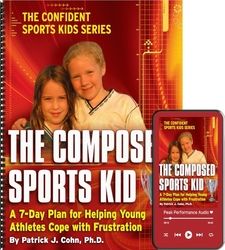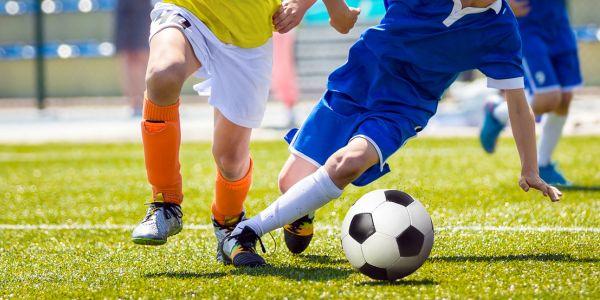Young Athletes That Struggle With Composure
I have a special announcement for you today, but first I want to share a sports parent’s story with you…
Over the last few weeks, several parents and coaches posted comments on our video about why kids become frustrated in sports. If you missed the first two videos in this series, you can watch it on our blog:
How Athletes Become Frustrated
As a matter of fact, parents contact us every day with their stories. One sports parent describes how his son gets easily angry:
“My 14-year-old son has such high expectations for himself. If he does not hit the golf ball perfectly, or if he strikes out at baseball, he gets angry with himself. How do we get him to just have fun and let go of the mistakes?”
If you can relate to this parent’s story, your kids’ high expectations are one reason they shut down, cry, or lose their temper in practice and competition–when things don’t go according to plan.
What kids are most likely to have emotional tantrums during a game?
- Kids who are super competitive and hate to lose.
- Kids who work hard in practice and are highly motivated to succeed.
- Kids who demand a lot from themselves via their personal outcome expectations.
- Kids who have a need for approval from others such as parents and coaches.
- Kids who want to perform perfectly and can’t stand it when they mess up.
If your athletes fit one or more of the above profiles, help is on the way. I know you want what’s best for your athletes’ success and happiness in sports. I know I do. And parents should not blame themselves because their kids get upset easily after making mistakes.
I understand that coping with frustration is a tough challenge for both young athletes and their parents. Over 40% of parents we surveyed said their kids struggle with this issue…
For this reason, I’ve been working for six months to find a solution to cut through the clutter so I can help you and your kids overcome the ‘costly’ problems associated with frustration and anger in sports.
It’s costly because their emotional state effects your kids enjoyment and participation in sports.
The number one reason kids drop out of sports is because they no longer have fun.
When kids are frustrated, angry, or upset about their performance, they can’t have fun.
Making matters worse, parents, in their attempt to help kids improve emotional control and reduce their frustration, they often aggravate kids more. The more you punish the negative behaviors of anger and frustration, the more kids resent you.
But as I have said in previous videos, you can’t help kids improve by focusing on the negative behaviors. You must help your athletes modify their beliefs, expectations, and level of self-acceptance.
If all goes well, by next Friday I’ll have the solution for you. The new program will focus on helping you help kids who get upset, frustrated, or angry, particularly after mistakes or experiencing setbacks during sports.
Next week, you can watch a new video, which reveals my number one secret for helping athletes relax and cope with mistakes.
But if you have not seen my first two videos on this topic, you can watch them on our blog now:
How Athletes Become Frustrated
I’m working on a new video to show you an example of how you can modify your kids’ expectations so they can relax and let go of anger. It’s not rocket science. And you don’t need a doctorate in psychology to help your kids improve. Stay tuned!
Related Articles on Kids’ Mental Game:
- Teaching Sports Kids Emotional Intelligence
- Youth Sports: An Athletes “Emotional Tank”
- Addressing Outbursts in Youth Sports
*Subscribe to The Sports Psychology Podcast on iTunes
*Subscribe to The Sports Psychology Podcast on Spotify
The Composed Sports Kid

“The Composed Sports Kid” audio and workbook digital download program for young athletes and their parents or coach helps kids cope with frustration and anger in sports. Help your sports kids learn how to manage expectations and let go of mistakes so they can keep their head in the game.
The Composed Sports Kid system is really two programs in one–one program to train parents and coaches how to help their kids practice composure, and one program that teaches young athletes–ages 6 to 13–how to improve composure, let go of mistakes quickly, have more self-acceptance, and thus enjoy sports more!


I hope you can help us. We have a very good, competitive 10 year old. He is very good at baseball. Better than most of the kids on his team. He’s small but has the heart to succeed. But he is so hard on himself and throws tantrums if he didn’t get a hit. He might tag 3 kids out at home ( he’s a catcher), but if he thinks the ump called him out on a bad pitch(the umps are volunteers). He totally goes nuts. He’s been in therapy for a couple of years, and we really like the counselors. But all the positive reinforcement, the stars he earns for good behavior have not worked. He is such a wonderful bright, intelligent, loving kid. He has compassion for all people. And he loves baseball. But he actually got ejected today for it. He tries so hard not to over react. We are at our wits end. Should we just not let him play?
Punishing your son does not teach him the mental skill of composure, it only shows that it’s inappropriate to get upset. Do you want to start by helping him manage his expectations, as these caused him to get upset when he does not reach them.